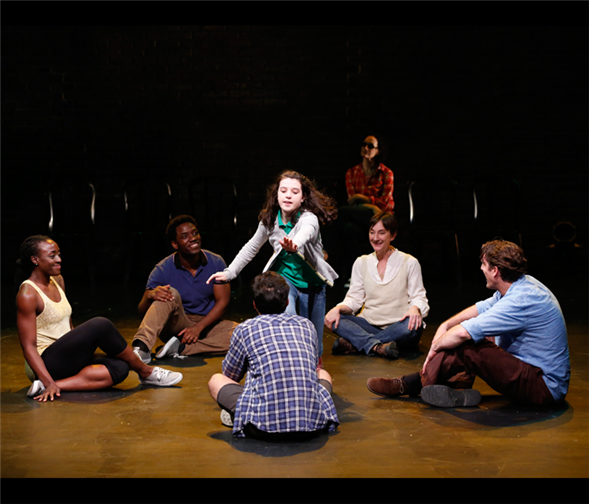Translate Page

A new play uses Keller's own words to tell her story
---
Did you know Helen Keller toured the Vaudeville circuit? Did you know she published a dozen books, starred in a silent film about her life, and had a scandalous love affair with a young man who wanted to marry her?
Jack Cummings III certainly didn't. Then he began researching Three Days to See, a show he's conceived and directed for the Transport Group that's made almost entirely from Keller's own writings.
Cummings, who is also Transport Group's artistic director, was shocked to discover how little he knew about a woman almost everyone has heard of. "When we think about Helen Keller, I think it falls into three buckets," he says. "Jokes, The Miracle Worker, and what I call 'needlepoint sayings' – little quotes that people put on posters or t-shirts. I feel like she's been buried by all those things. She's buried in iconography."
Three Days to See begins by dismantling the icons. On the stage of New York Theatre Workshop – which Transport Group has rented for this production – the seven cast members race to a line of microphones and rattle off every mean-spirited Helen Keller joke you might have heard on the playground. Taken together, the punchlines are unsettling and dehumanizing, and they prime us to be sympathetic to Keller's actual words.
After the jokes are finished, actors begin reciting Keller's own observations about her life, starting with the day she met her teacher Anne Sullivan. That's also the focal point of the The Miracle Worker, and anyone who knows that movie or play will recognize the events here. Cummings even has his cast recreate the film's version of the famous breakfast scene, where Sullivan forces a rebellious young Helen to eat with proper manners. Every gesture is directly lifted from the movie.
{Image1}
But at the same time, this isn't the breakfast scene we're used to. For one thing, all seven actors play Helen, stepping in and out of her dress as the character is passed around. For another, the Big Band classic "Sing Sing Sing" booms over the speakers, giving the moment a jumpy, comical bent. By the time it's over, we've arguably been forced to change how we understand this story and, by extension, Keller herself.
Which leaves Cummings free to explore something deeper about her legacy. "In order to get people to focus on her mind and her feelings and her words, I didn't want to represent her in a straightforward, biographical way," he says.
That's why the actors all take turns playing Keller, and it's why the stage pictures tend toward the metaphorical. When Keller reflects on her mother's death, for instance, the cast sits in a circle, like they're in a support group meeting. As they pass around a potted flower, which represents the dead woman, they share Keller's insights as though they were spontaneous expressions of grief.
Moments like this point to a fascinating statement that's inherent in the production. By speaking her words aloud, the performers are expressing them in a way that Keller herself never could. As Cummings says, "These actors are her interpreters, the way that Annie Sullivan would have been for her on stage in Vaudeville or in any situation where an audience needed to understand her."
But even as they are speaking for her, Keller is also speaking for the cast members. "She's working on our behalf as well, and I hope that through her, we in the audience are somehow getting to know the actors individually," Cummings says. "Because they're never trying to 'be' her in a realistic sense. I said, 'The most important thing is that I need you to find a personal connection to what she's saying.' And a lot of the text was divided up based on what people connected with."
In other words, Keller's reflections on justice, politics, art, and love allow her to unlock something in everyone. She may have needed interpreters, but she spent her entire life making deep connections with the world. "She was light years ahead of her time," Cummings says. "She was a humanitarian who came rather quickly to liberal thinking and compassionate thinking. She was speaking for all of us."
---
Mark Blankenship is the editor-in-chief of TDF Stages
Photos by Carol Rosegg. Top photo: The cast of Three Days to See.